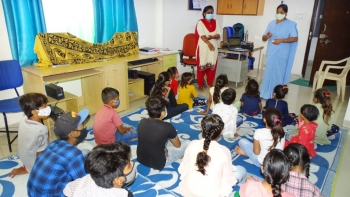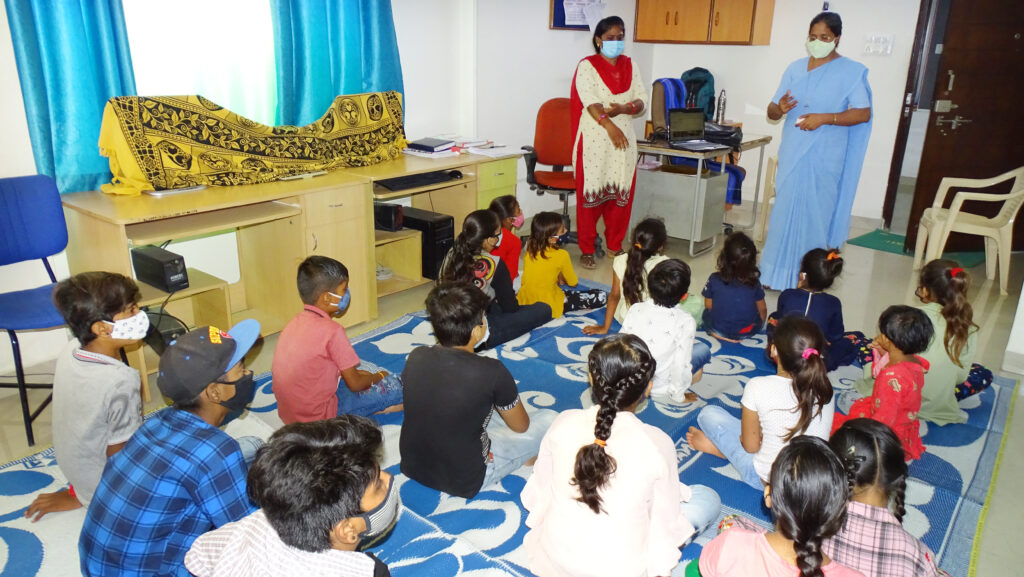
.png) Jacob Peenikaparambil
Jacob Peenikaparambil

As part of evaluating the impact of an HIV/AIDS project, I had the opportunity to interview a good number of men and women living with HIV/AIDS who are partners in that project. The stories shared by some of them are indeed heart-wrenching, and at the same time highly inspiring. The struggles some of them had to undergo and are still undergoing are heroic. The days I spent interacting with them were days of deep introspection and spiritual renewal. Their stories reveal the power of human beings and their resilience.
VISHWAS is the name of an HIV/AIDS intervention project initiated in 2003 by Holy Spirit Sisters (SSpS) of Central Province for holistic care and empowerment of People Living with HIV/AIDS (PLHIV). As the name indicates, the main purpose of the project is to instil hope and confidence (Vishwas) in the people living with HIV/AIDS so that they can live a meaningful and dignified life in spite of being infected by the dangerous virus.
Hemlata (name changed) has been a PLHIV for the last 15 years. Her husband was also a PLHIV and he died one week after he was detected having HIV. She and her son are positive and her daughter is negative. The daughter and son were 8 and 4 years of age when her husband died. Husband’s death shattered her life. She had to look after the two children single-handed without the support from any one. At this juncture, one of the Vishwas staff who was a counsellor at the ART centre of the Hospital guided her to Vishwas. Regular counselling and other support services provided by Vishwas instilled hope and self-confidence in her and she told herself, “I can live with HIV and I will educate my two children”.
She started going to a wholesale vegetable market daily to work as a head load worker along with a group of women. For the last 15 years she has been doing this hard and backbreaking work. She wakes up at 3.30 am and goes to the market and works up to 9.00 am.
She earns Rs. 300-400 per day. With her hard work and the support from Vishwas she educated her daughter and son up to class 12. Daughter is married and her son is working in a readymade garment shop. But Hemlata continues going to the market every day at 4 am for her work.
She said, “Today I am a confident and courageous woman who is ready to face any difficulty in my life. It is Vishwas that transformed me when I was helpless and depressed. I consider Vishwas as my mother who gave me a new life.”
The story of Rajkumari (Name changed) is distressing and at the same time inspirational. She was born in a very poor family and her parents did not send her to school. She was married at the age of 16. After having two girl children, her husband, who was a driver, died of HIV. She and her two daughters got HIV from her husband. According to her, husband was very cruel to her; he used to torture her for not giving birth to a boy.
After the death of her husband, Rajkumari had no support either from her or her husband’s family. She had to fend for herself and her two children. When she went to the ART centre for medicine she came to know about Vishwas. She has been part of Vishwas for the last 12 years. Various services received from Vishwas, especially counselling and monthly meetings, instilled in her hope and courage. She has been functioning as a domestic worker to earn her livelihood and the money needed to educate her two girl children. Now her elder daughter works as a nursing assistant, while she continues to work in a hospital as sanitation staff. Even though she is illiterate, she is very vocal and has the courage to fight for her rights.
Interviews with the PLHIV helped me to understand their situation. When the PLHIV come to know that he/she is infected with HIV, he/she is broken or shattered. Initially they face severe discrimination from the family members. Gradually the discrimination at home is reduced. Some of them are left alone when the family members come to know about their disease. They have to undergo financial crisis and struggle for their livelihood. Some women face a lot of pressure from the family members to have a child, even though conceiving a child by a PLHIV woman is highly risky.
Although there is no cure for HIV/AIDS, there is treatment which is known as Antiretroviral Therapy (ART). If a PLHIV takes the medicine regularly without failure, he/she can live long and lead an active life. Most of the PLHIV registered with Vishwas came to know about the project from the Vishwas staff at the ART Centre from where they get treatment for their disease. Some PLHIV came to know about Vishwas from their friends or relatives. As a result of taking part in various awareness programmes and training provided by Vishwas the PLHIV get a clear idea about HIV, how it spreads and how they can prevent it from spreading to others.
Vishwas supports the PLHIV with counselling, medicines for opportunistic diseases and additional nutrition. Regular counselling helps them to revive hope to live and to accept the disease and go forward with hope. As a result of taking ART medicine regularly and nutritional support from Vishwas their health has improved to a great extent.
Regular meetings at Vishwas provide them an environment for interacting with others and building relationships in a situation when they are left alone. The various programmes organized under the auspices of Vishwas provide them opportunities to express themselves and build their self-confidence.
The skill trainings organized by Vishwas have helped some PLHIV to learn new skills and start some income generating activities. For example, a woman PLHIV in Khandwa learned tailoring and bag making. Now she is earning an additional income between Rs. 3000 and 4000 per month, besides Rs. 4000 she earns through domestic work. The economic support given to some PLHIV to start income generation activities resulted in some members starting their own small business, like vegetable vending and increasing their monthly income.
The awareness programmes and training on human rights and gender equality helped women to become aware of their rights and assert them at least in some cases. For example, a woman fought for her right in the share of her husband’s property after his death. Many women said that they began to assert their right to make decisions at home along with men. Most of the men who were interviewed also said that important decisions at home are taken jointly by the husband and the wife.
Taking part in various events organized by Vishwas like International AIDS day, International Women’s Day and celebration of various religious festivals have helped them to develop their talents, to expand their knowledge and to appreciate other religions. Formation of women empowerment groups (Nari Shakti and Streevani) has helped women PLHIV to take up issues related to them to government departments. They also support each other when need arises.
Most of the women interviewed said that they feel at home in Vishwas where they can share their problems with the staff and other women, where they experience care, concern and compassion and where their human dignity is respected.
Along with providing holistic care to the PLHIV and empowering them through various training programme, Vishwas also conducts awareness programmes in educational institutions and for female sex workers. Prevention of HIV/AIDS is one of the core objectives of Vishwas. India needs many projects and organizations like Vishwas, as the country has a sizable number of PLHIV.
According to the Ministry of Health and Family Welfare, India was estimated to have around 23.49 lakh people living with HIV/AIDs in 2019. The report published by the Ministry states that HIV infections declined by 37% between 2010 and 2019.
HIV infection in India is mainly caused by engagement in high-risk behaviours. The main high-risk behaviours identified for HIV infection includes unprotected heterosexual behaviour, unprotected homosexual behaviour, and unsafe injecting drug use behaviour.
There are no dedicated hospitals for the treatment of HIV/AIDS patients. However, under the National AIDS Control Programme (NACP) of the Government, as of July 2020, there are 570 Anti-retroviral treatment (ART) Centers and 1264 Link ART Centers.
Vishwas works in close coordination with NACP and the ART Centres. One of the staff members of Vishwas is present at the ART Centres. The new PLHIV who come to the ART Centres are introduced to Vishwas and they are encouraged to get connected with Vishwas.
What makes Vishwas different from other NGOs working for the PLHIV is its holistic approach, consisting of prevention, care, medical support, nutritional support, support for skill training, supporting income generation activities and making the PLHIVs aware of their rights and helping them to access their rights by organizing PLHIV, especially women. Representatives of NGOs, who were invited to share their feedback on the interventions by Vishwas, acknowledged and appreciated the holistic approach of Vishwas.
Charitable and welfare activities have been an important component of the mission of Catholic Church all over the world. When HIV/AIDS began to spread alarmingly some religious congregations opted to work for the people infected and affected by this disease. The charity approach often exhibits an attitude of giving and receiving, and the people are often considered as receivers. Although the Vishwas project has provision for giving certain services, material things and even financial assistance in rare cases, what the PLHIV appreciate most is respecting their dignity and treating them as equals. Almost all persons whom I interviewed said that in Vishwas they experience a family atmosphere.
As a person who facilitated the evaluation of Vishwas project, I consider the most valuable aspect of the project is the trust PLHIV has in Vishwas. The main reason for this trust is creating and maintaining a family atmosphere in which the PLHIV experience love, care, concern and respect for their human dignity. This dimension is often missing in many charitable projects implemented by charitable organizations.